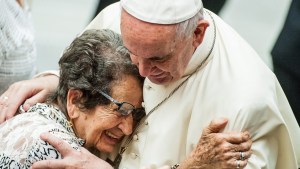Lenten Campaign 2025
This content is free of charge, as are all our articles.
Support us with a donation that is tax-deductible and enable us to continue to reach millions of readers.
As every year, the faithful who actively participate in the World Day of Grandparents and the Elderly on July 28, 2024, can receive a plenary indulgence. According to the Catholic faith, this kind of indulgence brings to the person who receives it under the right conditions the temporal purification for all sins they have confessed up to this point.
[If you’d like to better understand indulgences, check out our handy primer on indulgences, Part 1 and Part 2.]
The Apostolic Penitentiary — also known as the “Tribunal of Mercy” — issued a decree on July 18, ahead of the 4th World Day of Grandparents and the Elderly.
This event, set for the fourth Sunday in July and intended by Pope Francis to honor the older generations, has as its theme this year “Do not cast me off in my old age.”
Conditions for the indulgence
As in previous years, the text signed by the major penitentiary, Cardinal Angelo De Donatis, grants an indulgence to the elderly and to all the faithful who will participate “in the various functions that will be held throughout the world.”
Catholics who “devote adequate time to actually or virtually visiting their elderly brothers and sisters in need or in difficulty (such as the sick, the lonely, the disabled, …)” will also be eligible for this indulgence.
An ancient practice in Christianity, the indulgence is a sign of God’s forgiveness.
According to the Catholic faith, the faithful who die after having received a “plenary indulgence” (and without having sinned again) benefit from the remission of the punishment they have incurred for their past sins. They are exempt from purgatory. A plenary indulgence may also be applied, by the person who receives it, to a departed soul in purgatory, but not to another living person.
To benefit from this, however, certain conditions must be met. In this case, the decree mentions the standard requirements: detachment from any sin, confession, attendance at Mass, and prayer in accordance with the pope’s intentions.
Rome specifies that the plenary indulgence of July 28 may also be granted “to all those who, unable to leave their homes for a serious reason,” participate spiritually in the events and “intend to fulfill the three usual conditions as soon as possible.” They are invited to join the celebrations at a distance through the media.



